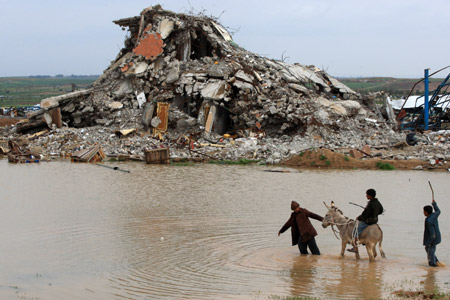Open crossings, ceasefire urged
Participants at the conference have also urged instant opening of Gaza border crossings and a durable ceasefire to lay foundation for international rebuilding efforts.

|
|
Palestinians pass house ruins at Jabalia refugee camp in the northern Gaza Strip March 2, 2009. An international donor's conference was held on Monday in Egypt in an effort to raise funds for the rebuilding of the Gaza Strip battered by Israel's 22-day military attacks. [Xinhua]
|
The UN chief warned that aid for Gaza's rebuilding would be impossible to proceed if border crossings between Gaza and Israel remain closed.
"The situation at the border crossings is intolerable," he said, adding "aid workers do not have access. Essential commodities cannot get in" and therefore the "first and indispensable goal" is to open crossings.
Israel has tightened a blockade on Gaza since it launched the massive offensive in Palestinian coastal enclave, only allowing in limited humanitarian aid.
Ban also stressed that the reconstruction of Gaza Strip needs a durable ceasefire in the Palestinian enclave. "When building a house, we begin with the foundation.... When it comes to rebuilding Gaza, this foundation must be a durable ceasefire," he said.
"We need to think comprehensively" to discuss the Palestinian economy and Gaza reconstruction, he added.
The Egyptian foreign minister said in the chair's conclusion statement that participants have called for "immediate, unconditional and sustained re-opening of Israel's crossings with the Gaza Strip to allow movement of people and goods into Gaza," and "demanded that Israel fully respect its obligations under international law and international humanitarian law."
The donors also expressed their concern that agreement on a lasting ceasefire in Gaza could not be reached till present, while underscoring the importance of achieving Palestinian national reconciliation, as another necessary requisite for any successful reconstruction effort undertaken by the donor community.
Abbas in his speech also urged for "a political settlement" to the conflict with Israel to go with the financial aid, saying the rebuilding efforts will remain powerless and threatened without a political settlement to the Palestinian-Israeli conflict, while the U.S. secretary of state, on her first Middle East trip since taking post, stressed that the international efforts to rebuild Gaza cannot be separated from the peace process between the Palestinians and Israel.
After a 22-day conflict, both Hamas and Israel declared a ceasefire on Jan. 18, but the truce remained fragile due to agreement on an Egypt-brokered long-term truce deal was hard to reach between Hamas and Israel. Sporadic exchanges of fire have not stopped since.
Hamas has offered an 18-month truce on the condition of lifting Israeli blockade and opening Gaza border crossings. But the Israeli insisted that there would be no long-term truce before its soldier Gilad Shalit, held by Hamas, is released. Hamas has demanded the release of 1,400 Palestinian prisoners in exchange for Shalit.
The uncertainty of Israeli politics also undermines the chances of an impending deal between Israel and Palestinians. Israeli Foreign Minister Tzipi Livni has turned down Prime Minister-designate Benjamin Netanyahu's offer to pull her Kadima party into a government led by the latter's Likud party after failing to persuade Netanyahu to support plans for a two-states-for-two-peoples solution to the Palestinian-Israeli issue and changes to the electoral system.
(Xinhua News Agency March 3, 2009)